MeeGo 2010: Unconference, football and the last word
I paused before sitting down for the last round of travel records about the Dublin MeeGo conference , especially since the third day was not eventful. Now everyone has left, thoughts have settled - and it's time to share them.
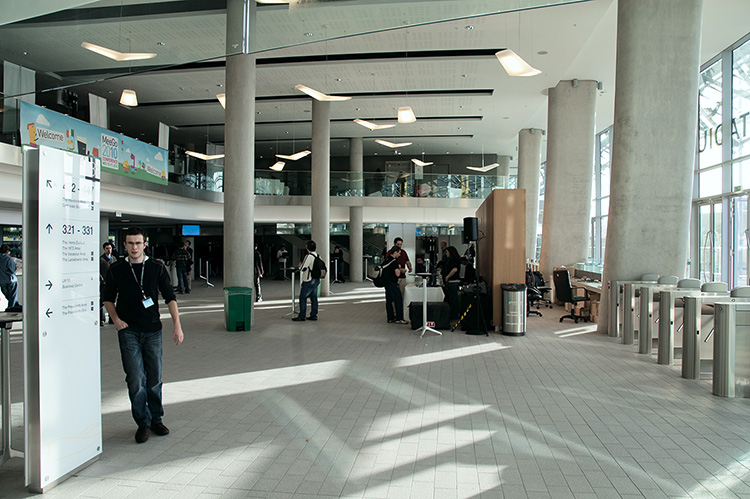
Funny, but the main distraction of the third day was the already mentioned attraction of unheard of generosity, when all conference participants who agreed to spend 5-7 minutes installing MeeGo were presented with a new Lenovo netbook. On the first day of distributing elephants, the organizers managed to bring only a small batch of netbooks that had literally flown away in a couple of hours, so the main blow fell on the last day of the conference - the so-called Unconference.
')
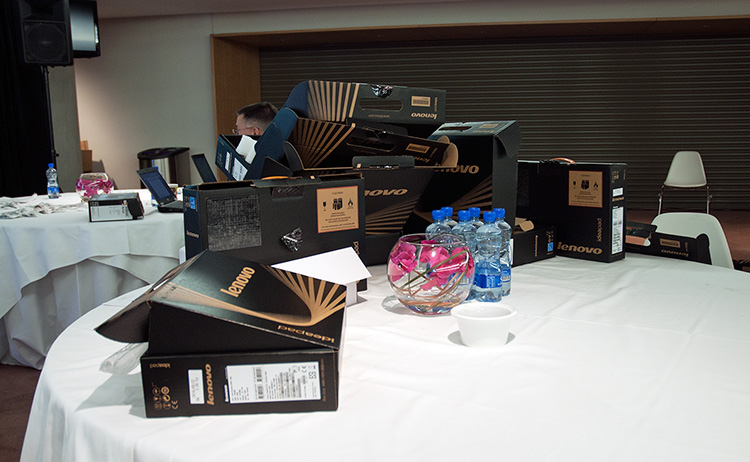
As you can see, the distribution of netbooks was very successful.
Unconference is a relatively fresh format of conference communication that fits into modern formats like heap pech. The essence is this: to the initially empty session grid (vertical - time slots, horizontal - platforms) anyone who wants to give a lecture, meeting or discussion attaches a piece of paper with the name of his event:
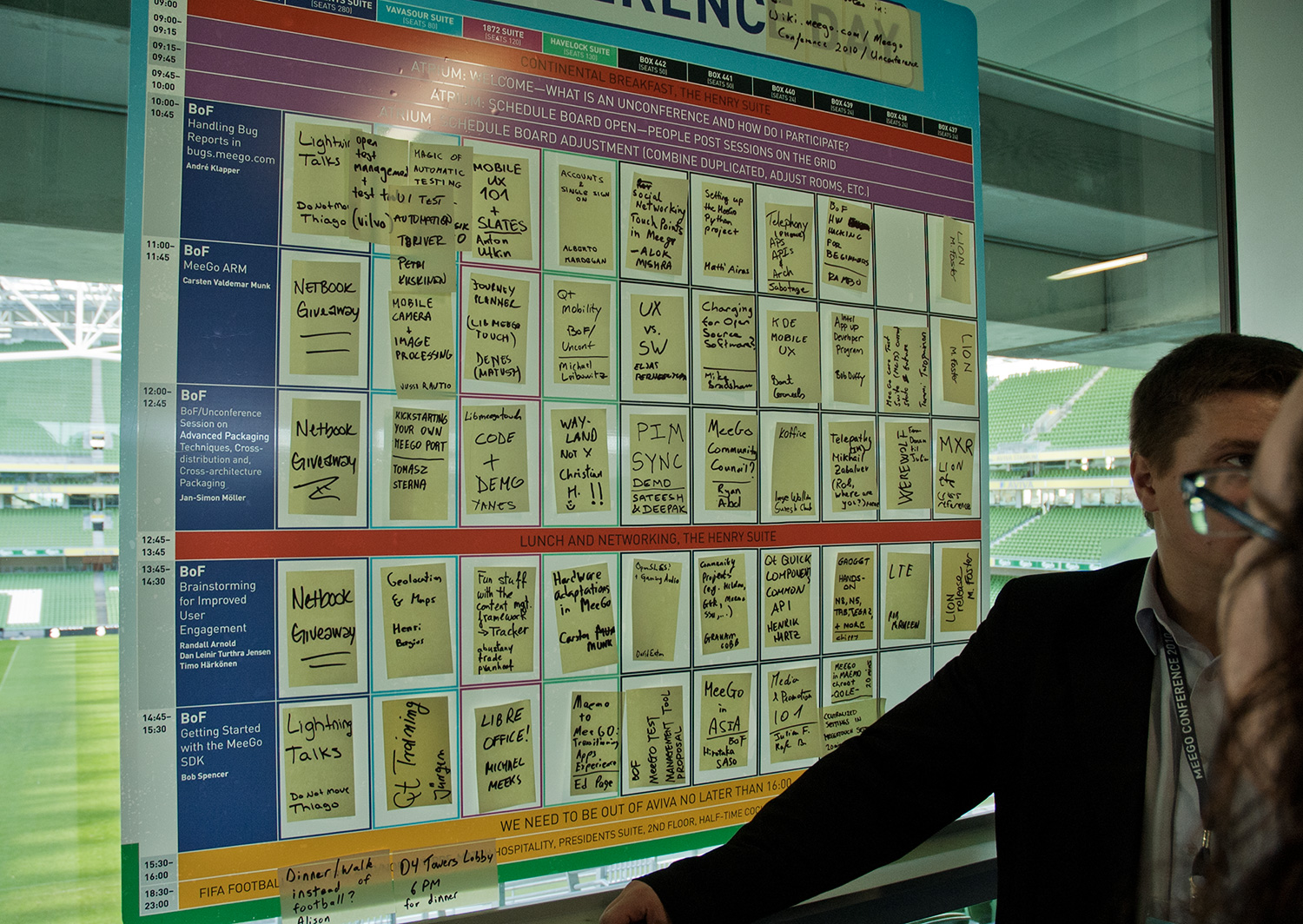
The controversial sessions move, some moments get shaken, and then the process of democratic choice takes place: people go to those lectures that interest them, so the more curious the subject, the more visitors there are. My speech (first row, third column) didn’t have many visitors, but then, going to other sessions, I realized that it was a common problem of the day - all the conference participants focused on distributing elephants.
Nevertheless, we had a rather vigorous discussion about the nuances of designing interfaces for tablet computers, and a little later the Finns had a good lecture about the importance of communication with users and user participation in the development:
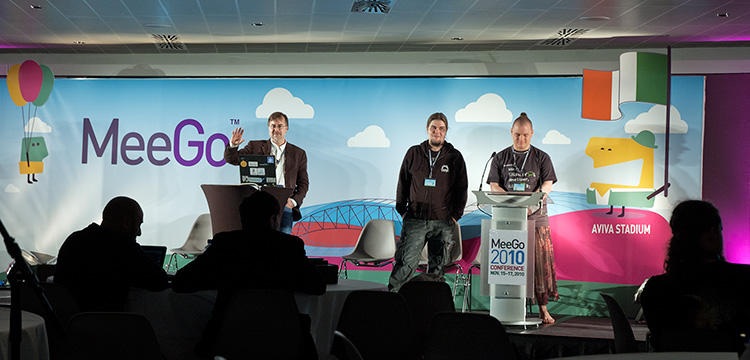
The day ended with a friendly football match between Ireland and Norway (I can’t look at the millionaires in shorts who diligently drive a leather ball around the lawn for a long time, so I left with a 1: 1 score - don’t ask, I don’t know what happened); Pay attention to the interactive advertising on the perimeter of the field - yes, MeeGo:
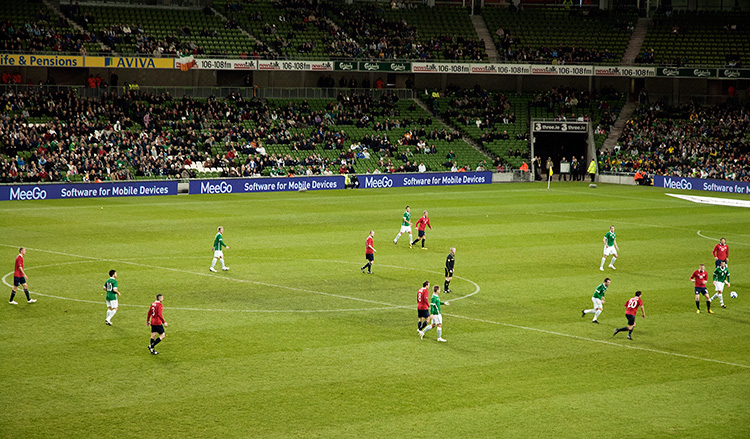
Now a few considerations that crystallized during and after the conference.
The community has two major drivers - Nokia and Intel. These drivers are not so divided, but, let's say, they pursue their own specific, quite clear interests. If MeeGo were a closed platform, it would mean her soon death, but here the situation, on the contrary, is much more favorable - rather, these are two parallel vectors of development that pull the participants' attention to themselves and expand the project itself. It's good.
Part of Nokia, I will not undertake to comment in detail; almost all sessions related to handheld, N900 and other related topics were very popular. Probably because there were a lot of people at the conference, one way or another related to Nokia’s projects (at some point I got the impression that about half of those present were Finns). Another thing is that everything is more or less clear with the handheld - there is Maemo, there will be MeeGo, Nokia has two strongest competitors in the form of iOS and Android, so further events (but not their outcome) are not so difficult to guess.

Quite another thing is, relatively speaking, embedded, the interest of Intel - everything is just more interesting there, because the market itself is not as densely built up as in the case of smartphones. Look here. Netbooks are the most obvious (and workable) environment for MeeGo, and this is the first operating system that had netbooks in mind from the very beginning. About IVI is not so much clear, but the technological demos are impressive, and against the horror that motorists now use, they look fiction in general. There was very little talk about the tablets at the conference, but this is a new topic in general, which is not clear how to approach - the WeTab version 1.0 conference demonstrated was rather crude, but some separate interface solutions (such as a scrolling desktop widget) were impressive.
It seems to me that Dominique Le Voll was the most curious project of the conference - it is not very impressive until you start looking into the details, and these details demonstrate several trends. The project is completely commercial (no one hides this), although it relies heavily on open source. The project returns a decent part of the code back to the community, thus paying the price for free ride, and the community helps move parts of the development forward. And finally, another important point - Dominic argues that waiting for stable releases is the same as waiting for weather from the sea (or teasing competitors) - you have to act here and now.
The whole story with MeeGo is formed into a rather slim picture, with something like the following: the glands finally faded into the background, software development became the cornerstone of creating new electronic products, and users who had a completely fantastic choice stopped to think about technical capabilities their devices, and choose primarily workable, liveable solutions. All this will have the most health-improving effect on the industry, and it remains for me to assume this: if your next project or even a startup is going to intensively develop some complex electronic consumer products, then maybe MeeGo can become the basis of your decision today, already on this stages of your life. Amino is about to release a set top box. Indamixx are going to roll out a tablet for musicians by spring - according to the participants of the beta program, it will be a hit. And all this is very good news - join them.

Funny, but the main distraction of the third day was the already mentioned attraction of unheard of generosity, when all conference participants who agreed to spend 5-7 minutes installing MeeGo were presented with a new Lenovo netbook. On the first day of distributing elephants, the organizers managed to bring only a small batch of netbooks that had literally flown away in a couple of hours, so the main blow fell on the last day of the conference - the so-called Unconference.
')

As you can see, the distribution of netbooks was very successful.
Unconference is a relatively fresh format of conference communication that fits into modern formats like heap pech. The essence is this: to the initially empty session grid (vertical - time slots, horizontal - platforms) anyone who wants to give a lecture, meeting or discussion attaches a piece of paper with the name of his event:

The controversial sessions move, some moments get shaken, and then the process of democratic choice takes place: people go to those lectures that interest them, so the more curious the subject, the more visitors there are. My speech (first row, third column) didn’t have many visitors, but then, going to other sessions, I realized that it was a common problem of the day - all the conference participants focused on distributing elephants.
Nevertheless, we had a rather vigorous discussion about the nuances of designing interfaces for tablet computers, and a little later the Finns had a good lecture about the importance of communication with users and user participation in the development:

The day ended with a friendly football match between Ireland and Norway (I can’t look at the millionaires in shorts who diligently drive a leather ball around the lawn for a long time, so I left with a 1: 1 score - don’t ask, I don’t know what happened); Pay attention to the interactive advertising on the perimeter of the field - yes, MeeGo:

Now a few considerations that crystallized during and after the conference.
The community has two major drivers - Nokia and Intel. These drivers are not so divided, but, let's say, they pursue their own specific, quite clear interests. If MeeGo were a closed platform, it would mean her soon death, but here the situation, on the contrary, is much more favorable - rather, these are two parallel vectors of development that pull the participants' attention to themselves and expand the project itself. It's good.
Part of Nokia, I will not undertake to comment in detail; almost all sessions related to handheld, N900 and other related topics were very popular. Probably because there were a lot of people at the conference, one way or another related to Nokia’s projects (at some point I got the impression that about half of those present were Finns). Another thing is that everything is more or less clear with the handheld - there is Maemo, there will be MeeGo, Nokia has two strongest competitors in the form of iOS and Android, so further events (but not their outcome) are not so difficult to guess.

Quite another thing is, relatively speaking, embedded, the interest of Intel - everything is just more interesting there, because the market itself is not as densely built up as in the case of smartphones. Look here. Netbooks are the most obvious (and workable) environment for MeeGo, and this is the first operating system that had netbooks in mind from the very beginning. About IVI is not so much clear, but the technological demos are impressive, and against the horror that motorists now use, they look fiction in general. There was very little talk about the tablets at the conference, but this is a new topic in general, which is not clear how to approach - the WeTab version 1.0 conference demonstrated was rather crude, but some separate interface solutions (such as a scrolling desktop widget) were impressive.
It seems to me that Dominique Le Voll was the most curious project of the conference - it is not very impressive until you start looking into the details, and these details demonstrate several trends. The project is completely commercial (no one hides this), although it relies heavily on open source. The project returns a decent part of the code back to the community, thus paying the price for free ride, and the community helps move parts of the development forward. And finally, another important point - Dominic argues that waiting for stable releases is the same as waiting for weather from the sea (or teasing competitors) - you have to act here and now.
The whole story with MeeGo is formed into a rather slim picture, with something like the following: the glands finally faded into the background, software development became the cornerstone of creating new electronic products, and users who had a completely fantastic choice stopped to think about technical capabilities their devices, and choose primarily workable, liveable solutions. All this will have the most health-improving effect on the industry, and it remains for me to assume this: if your next project or even a startup is going to intensively develop some complex electronic consumer products, then maybe MeeGo can become the basis of your decision today, already on this stages of your life. Amino is about to release a set top box. Indamixx are going to roll out a tablet for musicians by spring - according to the participants of the beta program, it will be a hit. And all this is very good news - join them.
Source: https://habr.com/ru/post/108560/
All Articles